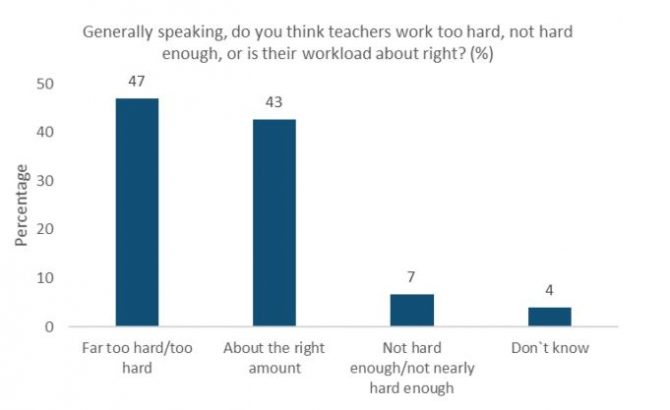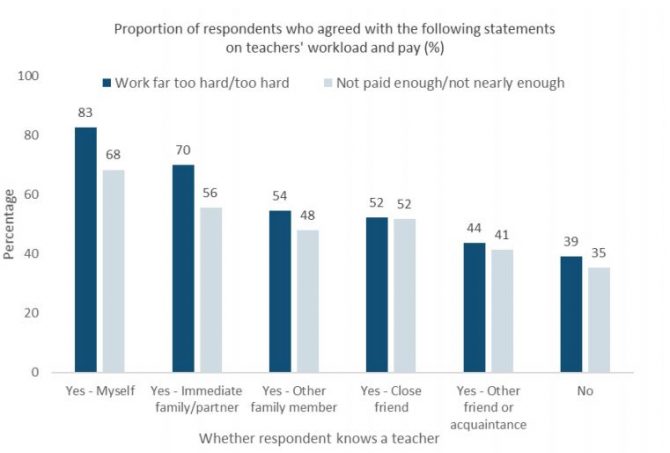Older people are more likely to think teachers have a manageable workload, and many parents still don’t know about changes to GCSE grades, a new survey shows.
The Department for Education has published its latest survey on the British public’s attitude towards education.
The DfE surveyed 2,491 respondents and the data was weighted to reflect the make-up of the country.
Here’s what they found.
1. Only 47 per cent of people feel teachers work too hard
When asked for their views on teachers’ workload, 47 per cent said teachers worked too hard, while 43 per cent believed their workload was “about the right amount”. Seven per cent said teachers don’t work hard enough.
The OECD’s TALIS teacher survey found that lower secondary teachers in England spent on average 46.9 hours a week working in 2018, up from 45.9 hours five years ago. The average working hours across the OECD countries was 38.8 in 2018.
The DfE’s teacher workload survey last year reported that that the average number of hours worked by teachers and middle leaders in 2019 was 49.5. The national average for all full-time workers is around 38.
Forty-four per cent of respondents believe teachers are paid about the right amount, compared to 42 per cent who feel that teachers are not paid enough.

2. Older people are more likely to think teachers have it easy
Attitudes towards teacher’s pay and workload differs depending on who is asked.
Among those aged 75 years and above, 36 per cent were least likely to say teachers worked too hard, compared with around 50 per cent of respondents aged 18 to 74 years.
People’s level of education also affected their answers, with degree holders most likely to say that teachers worked too hard (60 per cent), compared to 36 per cent of those without qualifications.
3. Teachers’ friends and family have more sympathy
Perhaps unsurprisingly, there is a linear relationship between whether respondents knew a teacher in a personal capacity and their attitudes towards teachers.
Forty-two per cent of those with family or friends who work as a teacher believe they are not being paid enough, and 47 per cent felt they worked too hard, compared with 39 and 35 per cent respectively among those who don’t know a teacher.

4. Many parents still don’t know GCSE grades have changed
Despite the changes having come into effect in 2017, a fairly large proportion of parents still haven’t heard about the shake-up of the GCSE grading system.
Just 56 per cent of respondents with children in their household said they’d heard of the changes.
Worryingly, the proportion of those with 11 to 15-year-olds in their household who’ve heard of the changes is just over three quarters, while 84 per cent of those with 16 to 17-year-olds in their household were aware of the shake-up.
5. Four in five think studying a language is important
The survey found 83 per cent of respondents believe studying a foreign language GCSE is very or fairly important.
A further 61 per cent said it will be much more important in the next 10 years.







The statistic that jumps out to me, which I did not expect, is that it looks as though 32% of teachers think they are paid enough (or indeed more than enough).
Teachers get around 14 weeks off per year. Kids are leaving schools these days and they are unable to spell, punctuate, show respect to elders, etc etc.
So no, they do not work hard enough. They put in the hours = 36 per week but are they teaching or passing time.
Marking books at home yadda yadda yadda = Bullshit.
I don’t think teachers should be expected to teach respect to elders. That’s a parenting job.
I also think a good education requires young people to do a whole lot more than mere spelling and punctuation. In fact, you could argue (though I wouldn’t) that technology has rendered the teaching of spelling and punctuation obsolete
Respect? That is the parents responsibility and they need to take ownership of their own child’s behaviour. Teachers are not accountable to parents. Parents are accountable to their child’s education, helping them with homework, showing active interest. Teachers are not there to accept abuse from children or their parents, they are there to teach their specialism, if a child chooses not to listen or work then their parent needs to act.
14 weeks? Does this make up for the amount of 12 hour days they do? Yes it does happen and it’s b******t to say otherwise.
Besides several of those weeks are spent working, fact! So consider your information before you make ridiculous comments.